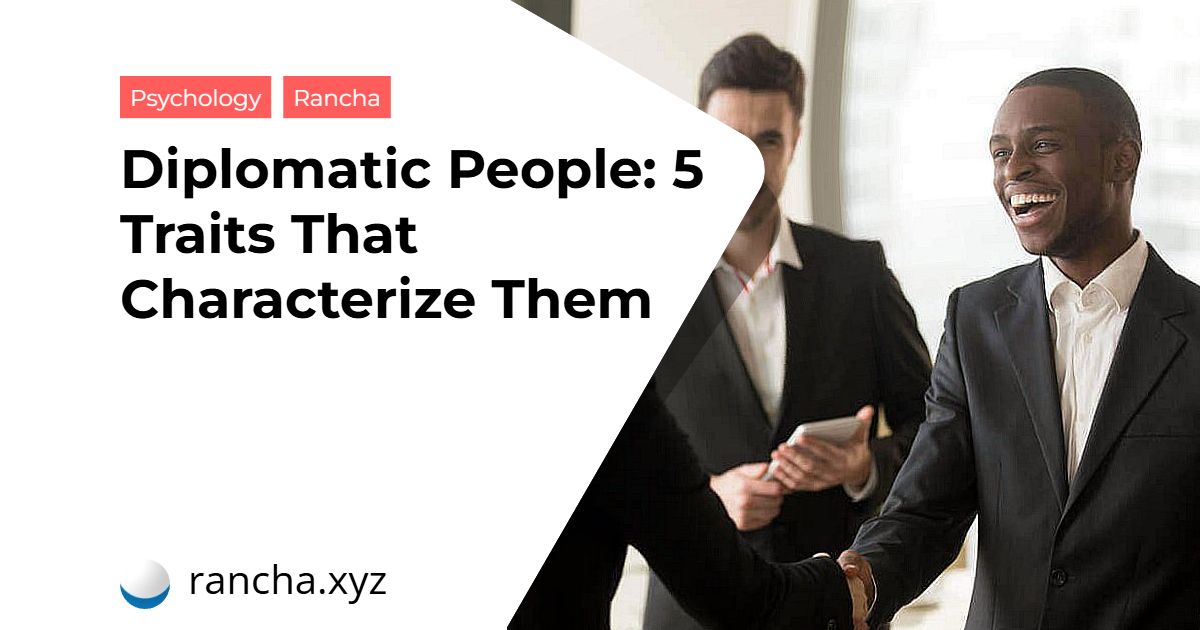On many occasions, we think that being too impulsive or “saying things to the face” necessarily imposes a kind of condemnation on us: that of being disrespectful. Nothing is further from reality: sincerity is not necessarily at odds with education. It has more to do with knowing how to send messages clearly and gently but assertively. That’s what diplomatic people do.
It is also true that the latter usually have a series of specific skills that allow them to do their jobs better and maintain healthier social relationships. But, as you already know, skills can be trained! So if you want to develop these skills, write them down.
Basic Taxonomy of Diplomatic Persons
In order to understand how diplomatic people are, we take as a reference the personality traits that professionals who are dedicated to this (for example, ambassadors) tend to have. For this purpose, we will describe which, according to Costa and McRae’s Big Five model, are the stable factors of which the personality of diplomats is composed.

Openness to experience
Someone who is destined for a foreign country, in which he must play a mediating role, must be curious and open. For this reason, it is assumed that he is willing to understand and adapt to the world around him, its people, its culture, its traditions… This leads him to be tolerant and respectful of what will be his home during years old.
So that open mindset is the foundation on which the rest of your skills are built. This position assumes knowing how to listen to opinions contrary to your own and, most importantly, knowing how to use them to your advantage. A prerogative can become an opportunity.
Taking into account the complaints, requests, misunderstandings of others can help you improve. Not only the relationship with your customers or your team, but with yourself. It helps you to be more self-critical and to understand how others think and are. So don’t be closed-minded, listen and learn.
emotional stability
Costa and McRae define this as the opposite of neuroticism. In the case of diplomatic people, this should be low or insignificant. Let’s imagine that there is an institutional crisis and those responsible for solving it were easily overcome by emotions.
It would be absolutely absurd to leave in someone else’s hands such an unpredictable task with as much impact as mediation. It is advisable and much more precise for a diplomat to have a quiet and peaceful character. Furthermore, this attitude is especially valuable in stressful situations or when making highly relevant decisions.
Emotional stability in itself enables diplomacy. Keeping calm in daily life enhances our analytical and strategic skills. Being able to stay calm in situations of high pressure or responsibility makes a difference. This does not mean that, at any given time, we cannot feel anger or frustration. But the key is that these people know how to control them.
Responsibility
Evidently, diplomatic people have a very high sense of duty. To obtain satisfactory results, it is necessary that they have self-discipline and order. However, this cannot become rigidity or stubbornness, as we know that to be a good negotiator, in many cases, we have to be more flexible.
The more rigorous and faithful you are to yourself, the greater your credibility and trustworthiness. Let’s think about someone in our family. To whom would you entrust a very important task: someone who proves to be responsible in their day-to-day lives or who does not appear to be trustworthy?

Kindness
In order to exercise this profession, cordiality – good treatment – is one of the most basic personality traits. And not only because of the empathy and cooperation that are needed in an intercultural environment, but also because of the essential elements that your contacts have for a diplomat.
Having happy, valued and understood people around you is a very important basis for the good performance of your work. A loving person usually has a solid social inner circle, based on trust and respect.
It is one of the key factors in the personality of anyone who wants to be diplomatic. This does not mean being false or always trying to say what the other person wants. It is based on trying to maintain coherence between thoughts/values and behaviors without harming the people around and those who have contrary opinions. That is, being able to make observations without damaging sensibilities.
Extroversion
Although it is closely related to openness to experience, it cannot be considered the same thing. Extraversion refers more to a person’s tendency to want to relate to other people. In the case of a diplomat, this quality is basic.
Someone with your responsibility must be assertive, talkative, sociable and energetic. He must handle communication skills and be comfortable exchanging opinions with others. If you are withdrawn or shy, many of your tasks will require extra effort that will eventually wear you out.
Therefore, diplomatic people have a personality that is open to dialogue, resolute, negotiating and extroverted. They are charismatic, willing to see the world, emotionally stable, kind and very responsible. And you, do you fit this profile or do you know someone who does?
 rancha.xyz Be free to choose their own route to self-knowledge, health and balance of body and soul.
rancha.xyz Be free to choose their own route to self-knowledge, health and balance of body and soul.




